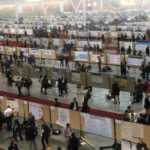ACR Convergence 2021 is right around the corner, and it’s going to be even bigger and better this year. The Annual Meeting Planning Committee (AMPC), ACR staff and volunteers learned a lot about virtual conferences in 2020 and have built on that experience to offer an interactive, educational and exciting event that will take place Nov. 1–10. This year’s program has “so much wonderful content,” says AMPC Chair Sharon Kolasinski, MD, professor of clinical medicine in the Division of Rheumatology at Penn Musculoskeletal Center, Perelman School of Medicine, University of Pennsylvania, Philadelphia. Planning ACR Convergence 2021 is “an extraordinary undertaking that is just joyful,” she says, citing the collaboration and excitement that go into bringing “the world’s best rheumatology meeting to fruition.”
The meeting kicks off Nov. 1 with early access to the virtual meeting platform, followed by advance programming Nov. 3–5, which includes the all-new Global Rheumatology Summit, Basic and Clinical Research Conference and Radiology Bootcamp. ACR Convergence 2021 scientific programming and special events will be Nov. 5–9, a dedicated Business of Rheumatology and Rehab program will be Nov. 8–9 and the ACR Review Course is on Nov. 10.
Planning a Premier Event
Planning for the meeting begins about a year ahead of time when the committee is selected. Dr. Kolasinski, currently serving the first of a three-year term as chair, has been leading the charge, guiding the committee in selecting the most innovative, relevant and practical content. “We really benefit from the years of experience of all of the people at the ACR, all the processes that are in place and the experience of the committee members, many of whom have served in other capacities on ACR committees and bring their knowledge and expertise, not just of subject matter, but to how to get things done,” Dr. Kolasinski says. (See box below, right, for a few key AMPC members.)
Some new offerings this year include Community Hubs, situated on the main program so they’re easy to find; new communities for educators, the business of rheumatology, aging, early career and ultrasound; and American Board of Pediatrics maintenance of certification (MOC) points. Also new is the combined basic and clinical research conference, which will address rheumatology complications of emerging viral infections/SARS-CoV-2.
Scientific Program
A significant portion of the planning effort is put into the scientific program. Session topics are based on feedback from 2020 attendees, ideas from ACR members, input from committee members and suggestions from other ACR committees (e.g., Government Affairs, Workforce & Training, Education). AMPC members independently rank the numerous proposals, and then the group convenes to create the basic agenda. This year’s program includes “a very broad range of the best in clinical and basic science research,” Dr. Kolasinski says. Sessions will cover such topics as clinical trial design in lupus; preclinical rheumatoid arthritis; osteoarthritis phenotypes and new directions in therapeutics; climate, pollution and rheumatic diseases; and diversity and inclusion topics, such as clinical trials design and recruiting trainees and faculty. The focus of the Great Debate will be on enhancing lupus nephritis therapy, specifically asking, “Is your next step belimumab or voclosporin?”


